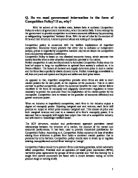Outline the reasons why the process of industrialization in developing countries might require government intervention. How far do these reasons justify the different forms of intervention that have been used to promote and direct industrial development?
Outline the reasons why the process of industrialization in developing countries might require government intervention. How far do these reasons justify the different forms of intervention that have been used to promote and direct industrial development?
Every Less Developed Country (LDC) seeks industrialization, or structural change as it is otherwise called, as this can lead to a higher GDP per capita, which can lead to a higher quality of life in the LDC's. In fact growth in GDP per capita (p.c) is seen as an indicator of industrialization. It can often be difficult for the population of a country to bring about industrialization in an efficient and well directed manner by themselves, it is here that the government can play a huge in role in managing the whole process of structural change, indeed industrialization may not occur at all if the government does not intervene or at the very least that it will progress very slowly. There are many situations which create necessity for intervention, the most cited reason is market failure, this can mean that the market is too small and therefore investment is needed, however it can be less clear cut, it can cause development to be unsustainable, for example if natural resources are depleted at faster rates than they are replenished development becomes unsustainable. Also a market that is too small may lead to a co-ordination problem between local firms. If firms invest at the same time all firms will make a profit, this sort of situation would help to break the vicious circle (Fig 1) most LDC's find themselves in.
Investing simultaneously would cause the average costs of all firms to fall, assuming external economies of scale and would lead to a virtuous circle. (Fig 2)
However no firm finds it profitable to invest at the same time, hence the government needs to intervene to help this process. Two ways of doing this are by investing in industries themselves or by encouraging Foreign Direct Investment (FDI). Another type of investment, that of investment into economic infrastructure is another way of directing and promoting structural change. Economics infrastructure may be defined as ' the underlying amount of physical and financial capital embodied in roads, railways and other forms of transportation and communications plus public services such as health care and education.'1 It is widely believed that the improvement of economic infrastructure is essential in the process of industrialization, roads and other means of transport, along with electricity and water supplies facilitate and help to integrate the economic activities of a society. For example a tractor may help to increase the vegetable output of a farm but with out adequate transport facilities to get the extra output to markets it may not add anything to the national food production. However it is another area of investment in economic infrastructure that is going to be concentrated on here, along with FDI, the area of education.
Every Less Developed Country (LDC) seeks industrialization, or structural change as it is otherwise called, as this can lead to a higher GDP per capita, which can lead to a higher quality of life in the LDC's. In fact growth in GDP per capita (p.c) is seen as an indicator of industrialization. It can often be difficult for the population of a country to bring about industrialization in an efficient and well directed manner by themselves, it is here that the government can play a huge in role in managing the whole process of structural change, indeed industrialization may not occur at all if the government does not intervene or at the very least that it will progress very slowly. There are many situations which create necessity for intervention, the most cited reason is market failure, this can mean that the market is too small and therefore investment is needed, however it can be less clear cut, it can cause development to be unsustainable, for example if natural resources are depleted at faster rates than they are replenished development becomes unsustainable. Also a market that is too small may lead to a co-ordination problem between local firms. If firms invest at the same time all firms will make a profit, this sort of situation would help to break the vicious circle (Fig 1) most LDC's find themselves in.
Investing simultaneously would cause the average costs of all firms to fall, assuming external economies of scale and would lead to a virtuous circle. (Fig 2)
However no firm finds it profitable to invest at the same time, hence the government needs to intervene to help this process. Two ways of doing this are by investing in industries themselves or by encouraging Foreign Direct Investment (FDI). Another type of investment, that of investment into economic infrastructure is another way of directing and promoting structural change. Economics infrastructure may be defined as ' the underlying amount of physical and financial capital embodied in roads, railways and other forms of transportation and communications plus public services such as health care and education.'1 It is widely believed that the improvement of economic infrastructure is essential in the process of industrialization, roads and other means of transport, along with electricity and water supplies facilitate and help to integrate the economic activities of a society. For example a tractor may help to increase the vegetable output of a farm but with out adequate transport facilities to get the extra output to markets it may not add anything to the national food production. However it is another area of investment in economic infrastructure that is going to be concentrated on here, along with FDI, the area of education.







